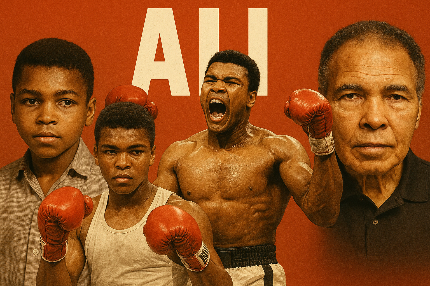Introduction
Muhammad Ali, whose real name was Cassius Marcellus Clay Jr., was more than just a boxing legend. He was a symbol of bravery, activism, and inspiration around the world.
Muhammad Ali was known as “The Greatest” and became a symbol of faith, resistance, and conviction beyond sports. His life was a powerful example of strength, both physical and moral.
He won Olympic gold medals and heavyweight titles, and he fought against war. He also did humanitarian work.
Table of Content
- Early Life and Background
- Rise to Boxing Stardom
- Defeating Sonny Liston (1964)
- Refusal to Serve in Vietnam War
- Comeback Fights
- Boxing Style and Influence
- Parkinson’s Disease and Humanitarian Work
- Death and Global Mourning
- Legacy Beyond the Ring
- Famous Muhammad Ali Quotes
- Conclusion

Early Life and Background
In Louisville, Kentucky, USA, on January 17, 1942, Muhammad Ali was born. Ali saw racial injustice from a young age because he grew up in a segregated America. When Cassius Clay was 12, someone stole his bike.
He promised to “whup” the thief, which led him to boxing coach Joe E. Martin, who saw a lot of potential in the young boy. Ali had won 100 amateur fights by the time he was 18. He also won a gold medal at the 1960 Rome Olympics, where he fought for the United States in the light heavyweight division.
Rise to Boxing Stardom
Muhammad Ali’s unique boxing style stood out after he turned pro in 1960. He often declared:
“Float like a butterfly, sting like a bee. His hands can’t hit what his eyes can’t see.”
Muhammad Ali was known for being loud, rude, and making prophetic fight predictions. He was different from any other boxer before him because he had a level of charisma that made matches into international events.
Defeating Sonny Liston (1964)
Muhammad Ali shocked the world by beating heavyweight champion Sonny Liston in 1964, when he was only 22 years old.
After the victory, he famously said, “I am the greatest!” I shook up the world! Not long after winning, he announced that he was becoming a Muslim and changed his name from Cassius Clay to Muhammad Ali, with help from Malcolm X and the Nation of Islam. This was a turning point that showed how committed he was to his beliefs.
Refusal to Serve in Vietnam War
During the Vietnam War in 1967, Ali refused to join the U.S. military because of his religious beliefs and moral objections. He stated, “I don’t have any quarrel with the Viet Cong…” No Viet Cong ever called me [a racial slur].
As a result, Muhammad Ali faced several consequences:
- He was stripped of his titles,
- Banned from boxing for 3.5 years, and
- Faced prison time (which was eventually overturned by the Supreme Court in 1971).
His stance made him a global symbol of resistance and a hero to anti-war and civil rights movements, particularly among young African-Americans and activists worldwide.
Comeback Fights
Muhammad Ali was determined to box again in 1970, even though he had been banned.
Fight of the Century” (1971)
- Opponent: Joe Frazier
- Place: Madison Square Garden in New York
- Ali lost by decision, but it was an epic 15-round fight that millions of people watched.
Rumble in the Jungle” (1974)
- Opponent: George Foreman
- Location: Zaire (now DR Congo)
- Result: Ali wins by knockout using the famous “rope-a-dope” strategy
Thrilla in Manila” (1975)
- Opponent: Joe Frazier (3rd fight)
- Location: Philippines
- Brutal 14-round battle; Ali wins and cements his legacy
These fights not only made him famous, but they also made boxing a cultural phenomenon.
Boxing Style and Influence
Muhammad Ali wasn’t the hardest puncher
- He was fast
- Good defense
- Good footwork
- Good ring intelligence
- Lot of charm.
These qualities made him one of the best all-around boxers of all time. He won 56 fights (37 by KO) and lost 5. He was an inspiration to future boxing greats like Floyd Mayweather, Lennox Lewis, and Mike Tyson.
Sports Illustrated called Ali “Sportsman of the Century,” and the BBC called him “Sports Personality of the Century.”
Parkinson’s Disease and Humanitarian Work
Parkinson’s Disease and Helping Others Ali started showing signs of Parkinson’s disease in the early 1980s.
Experts believe that the disease was caused by years of head trauma.
- He campaigned for peace and awareness of Islam even when he was sick.
- Delivered aid in developing countries
- He met with world leaders like Nelson Mandela, Fidel Castro, and Saddam Hussein.
- He also lit the Olympic torch at the 1996 Atlanta Olympics.
He became a world ambassador for peace, equality, and kindness.
Death and Global Mourning
Muhammadd Ali died on June 3, 2016, when he was 74 years old. His funeral in Louisville was attended by:
- World leaders
- Celebrities
- Athletes
- Millions of fans across cultures and religions
Barack Obama called him:
“A man who fought for us all.”
Legacy Beyond the Ring
Muhammad Ali’s influence goes far beyond boxing:
- Civil Rights Icon: He fought for justice, equality, and the rights of Black people.
- Religious Role Model: He initiated conversations about Islam in America.
- Culture Legend: Mentioned in music, movies, and books
- Global Humanitarian: He worked for peace and unity until the end of his life.
He left behind a plan for honesty, passion, and resistance that is still important around the world.
Famous Muhammad Ali Quotes
- “If you aren’t brave enough to take risks, you won’t succeed anywhere in life.”
- “Helping others is the rent you pay for your room here on Earth.”
- “Don’t count the days; make them count.”
- “It’s the pebbles in your shoe that wear you out, not the mountains ahead.”
Conclusion
Muhammad Ali is still one of the most famous and respected people in history. His legacy as a boxer, activist, and humanitarian still inspires people today. Ali taught us to fight for justice, dignity, and purpose, not just in the ring.
Muhammad Ali remained steadfast in his convictions amidst a tumultuous world, which is why he will always be regarded as the greatest.
